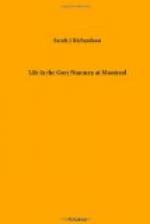Early the next morning we sailed out of the beautiful harbor of Naples, with a fair wind. The beautiful ship seemed to fly over the blue sea. I staid on deck gazing at my native city as long as I could. I thought then of my once happy home, of my poor, broken-hearted mother, of my unhappy father. Although he had cast me off through the foul play of Jesuitical intrigue, my love for my dear father remained the same. “Farewell, my dear Italy,” I said to myself. “When, my poor native land, wilt thou be happy? Never, never, so long as the Pope lives, and his wicked, murderous priests, to curse thee by their power.”
After we got out into the open sea, the motion of the ship made me feel very sick, and I was so starved out before I came on board, that what good provisions I ate on board did not seem to agree with me. My stomach was in a very bad state, for while I was in the lower regions of the convent I ate only a small quantity of very stale hard bread once in twenty-four hours, at the ringing of the vesper bells every evening, and the water given me was that in which the holy Mother Abbess had washed her sacred feet. But I must give the holy mother credit for one good omission—she did not use any soap.
The captain gave me a good state-room which I occupied with an English lady passenger. This good lady was accustomed to the sea, therefore, she did not suffer any inconvenience from sea-sickness; but I was very sick, so that I kept my berth for five days. This good Protestant lady was very kind and attentive during the whole passage, and kindly assisted me in getting my garments made up on board. On our arrival in London, the captain said that he would sail for America in two weeks time, and very kindly offered me a free passage to his happy, native land; and I could not persuade him to take any money for my passage from Naples, nor for the clothing he had given me.
My fellow passenger being wealthy, and well acquainted with people in England, took me to her splendid home, a few miles from London. At her residence I was introduced to a young French gentleman, a member of the Evangelical protestant church in France, and a descendant of the pious persecuted Huguenots. This gentleman speaks good English and Italian, having enjoyed the privilege of a superior education. His fervent prayers at the family altar morning and evening made a very deep impression on my mind. He became deeply interested in my history, and offered to take me to France, after I should become his lawful wife.
Though I did not like the idea of choosing another popish country for my residence, yet as my friend assured me that I should enjoy my protestant religion unmolested, I gave him my hand and my heart. My lady fellow passenger was my bridesmaid. We were married by a good protestant minister. My husband is a wealthy merchant—gives me means and opportunities for doing good. Home is precious in a foreign land. Our home is one of piety and peace and happiness. The blessed Bible is read by us every day. Morning and evening we sing God’s praise, and call upon the name of the Lord. Our prayer is that God may deliver beloved France and Italy from the curse of popery.




